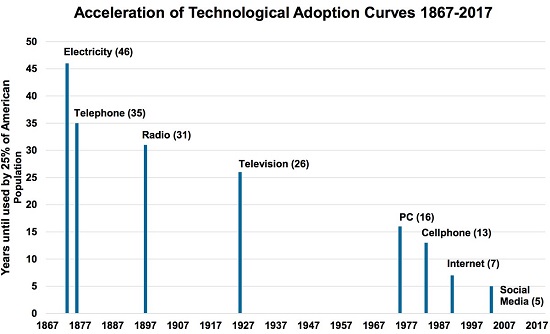Have We Lost the Ability to Adapt to Rapidly Changing Circumstances?
By Charles Hugh Smith
washingtonsblog.com
Successful adaptation requires a willingness to accept the risks of experimentation, innovation, flexibility and failure.
The idea that the pace of change in technology, the economy and society is accelerating is increasingly self-evident. That this acceleration exceeds our built-in ability to adapt to change is the thesis of the influential 1970 book Future Shock: as the pace of change accelerates, we can no longer process the transformative circumstances and enter a sort of brain-freeze/shut-down mode.
I discussed this most recently in Future Shock and the Greening of America (June 19, 2015) and Present Shock and the Loss of History and Context (May 22, 2013).

My insightful Facebook friend/correspondent A.A. recently proposed another reason why we’re failing to adapt to rapid, systemic change: we have grown too accustomed to affluence and comfort and have consequently lost the tools and values required to adapt to rapidly changing circumstances.
Here is an excerpt of A.A.’s Facebook post: “My own theory is easy postwar affluence leached intelligence from the US population. That is to say, the survival pressures that normally select for the smart and realistic were no longer operating.”
The word intelligence is of course loaded, but A.A.’s commentary defines this as smart and realistic–in other words, practical intelligence that enables successful adaptation.
This calls to mind one of the key elements of natural selection: that the ability to adapt successfully boils down to recognizing and conserving/ encouraging advantageous traits and eliminating /discouraging disadvantageous traits.
Here is Charles Darwin’s definition of natural selection: “This preservation of favorable variations and the rejection of injurious variations, I call Natural Selection.”
Two other quotes attributed to Darwin shed light on the role of intelligence in this process:
Intelligence is based on how efficient a species became at doing the things they need to survive.
In the long history of humankind (and animal kind, too) those who learned to collaborate and improvise most effectively have prevailed.
In summary: our ability to adapt successfully is based on enabling a wide range of variations and weeding out those that are injurious. Entrenched interests–self-serving fiefdoms and elites–have zero interest in the risky process of adaptation: their goal is to preserve their status quo power and income. If this requires sacrifices and risk, they push the sacrifices and risk onto others.
Successful adaptation requires a willingness to accept the risks of experimentation, innovation, flexibility and failure. As A.A. observed, decades of easy affluence leached out the pay-offs to accepting risk and sacrifice. Easy affluence nurtures a counter-productive sense of entitlement: affluence should be automatic, risks should be near-zero, and nobody should have to sacrifice or take risks to get their share of affluence.
In effect, the skills, moxie and values required for fast, successful adaptation had little selective advantage in the decades of easy affluence. And as easy affluence gave way to rising wealth and income inequality, access to cheap credit was widely viewed as the easy solution to the end of earned affluence based on savings.
This reliance on easy credit further leached the system of adaptive traits, and incentivized a mal-adaptive dependence on credit as the “solution” to every structural obsolescence.
The decline of selective pressures and the decay of adaptive resilience has parsed the populace into three categories:
1. Those who still believe the Status Quo narratives of credential-based meritocracy, a democratic, functioning central state, and a marketplace that can seamlessly solve whatever the central state cannot.
Those in this class are finding the gulf between these narratives and reality is widening to the breaking point.
2. Those who are losing faith in the Status Quo narrative but are resigned to its eventual messy demise.
Those in this class indulge in dystopian visions of the future, a world view that compellingly combines resignation, powerlessness, distraction and entertainment.
3. Those who understand the Status Quo is unsustainable and toxic and who see its demise as enormously positive and a huge opportunity for the planet, communities, families and individuals.
This is the group which understands that obsolete systems cannot survive the encounter with emerging realities, and that the only way to adapt successfully is to let a thousand flowers bloom and nurture what works for all participants and eliminate what is mal-adaptive and injurious to the interests of the many.
The status quo benefits the few at the expense of the many; it is exploitive, rapacious, increasingly fragile and morally indefensible. It is optimized for a specific type of cheap-energy/ cheap-credit /growth-must-be-permanent affluence–an era that is fading into history, whether we like it or not.
Those who cling to this status quo are clinging to a toxic collection of mal-adaptive values, incentives and traits that will only hasten the collapse of the current unsustainable arrangement.
If you found value in this content, please join me in seeking solutions by becoming a $1/month patron of my work via patreon.com.
View the original article at Washingtons Blog
Source Article from http://feedproxy.google.com/~r/DarkPolitricks/~3/2p0MN2Qd7gU/
Related posts:
Views: 0
 RSS Feed
RSS Feed

















 August 24th, 2017
August 24th, 2017  Awake Goy
Awake Goy  Posted in
Posted in  Tags:
Tags: 
















